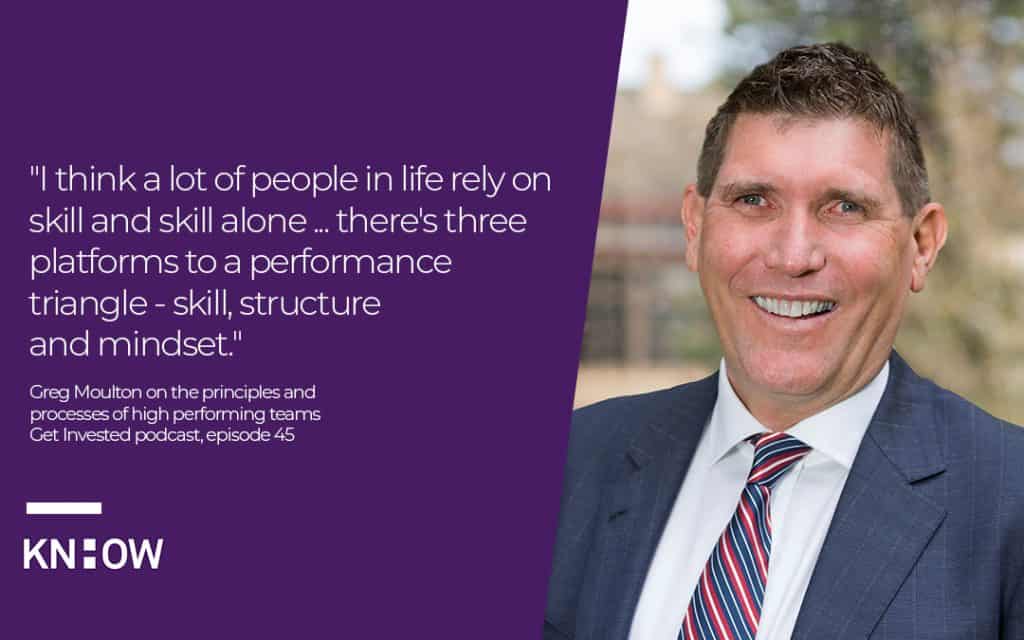Greg Moulton knows a thing or two about the recipe for a winning team. A highly regarded leadership consultant, Greg has worked with top performers in real estate, business and elite sport, learning that success is about much more than natural ability.
“I think a lot of people in life rely on skills and skill alone,” Greg told Bushy Martin on the Get Invested podcast. “So there’s three platforms to a performance triangle: skills, structure and mindset. I probably worked reasonably well at the skills side, I trained reasonably hard to hit a tennis ball okay, tactically (was) reasonably sound, but what I didn’t have is a structure to my weeks, my months, goals, what I wanted to achieve.”
Greg’s personal perspective shifted after working with Gilbert Enoka, general manager of the highly successful New Zealand All Blacks rugby union team.
“I was very lucky to spend a lot of time with him, spent a bit of time with the All Blacks in camps and really understood how they structured up their camps, and they’re the most successful, as most people know, on the world stage of any sporting team,” Greg said. “As a combination of all three of those things (skills, structure, mindset). The detail they put into honing skills, the time they put into preparing the best they can through the whole week, month etc., but Gilbert’s spent a lot of time on their mindset.
“So I don’t think any one of those three things is more important than the other. But without one of those, it just doesn’t seem to work. So in my youth I didn’t have a mentor, I had some great coaches but I didn’t have mentors. I guess after that all I’ve tried to do is get some people around me that support me in those three areas. So it’s not rocket science, but it’s just a matter of being really consistent with what you do in your behaviours.”
When trying to guide a team towards success, leader often overcomplicate it. Instead, Greg has boiled down his approach to focusing on three simple things each day.
“I think the biggest thing that’s helped me is not trying to do too much,” he said. “I’ve tried to do a few things really well rather than a whole lot of stuff and ending up doing it pretty average.
“So if I was to have two or three key messages, (and) have a roadmap for a period of time, I don’t go further than three years. Understand what you need to do in the 12 months you’re in. Understand what you need to do each day. And just break it down to three things you can be really, really bloody proud of, where you’ve done well.
“So we talk about important … Many people get into work, they’ve got all this stuff … bloody where do we start? I just sit down calmly at the end of each night and go, ‘Right. They’re the three things I’m going to do my very best at tomorrow. And if I do my very best at those three things times five days of the week, working days, there’s 15 things I’ve done well.’ And that multiplies out through the year.
“I think a lot of people get in there and they do everything to the best of their ability but if they’re not concentrating on it or protecting their time to do it well, they do it at a six or a seven out of ten. But if you really protect your time and nail it, you can probably do it at an eight or a nine out of ten. So you get more out of it.”
With successful teams come egos, who are often difficult for even the best leaders to manage.
“I think what I’ve done is try to build up people around them,” Greg said.
“So a lot of people’s egos are based around their self-importance and needing to be the top dog or top lady or whatever it is. And in each case, if I can build a team around those (people), so that they’re not … reliant on one or the other, they either leave, which is fine. That’s never really worried me. Or they actually go, ‘Okay, hey, this team gig’s not too bad. There’s other people out there doing things differently to me. They seem to have a more balanced life. They seem to be ending up more successful, even in different areas and all those types of things’.
“So in a couple of areas, unfortunately people have left but we built the team successfully and haven’t missed either their income, or their 50 goals if they’re a footballer out the front, whatever it is. But the real success stories are when people that have had massive egos and acted like prima donnas, actually come back into the team and start playing a team sport or a team effort in the commercial world. And they get more reward out of that. They generally become happier people, they generally don’t drop any income, if that’s their driver. I think that’s really what I’ve enjoyed. There’s been three or four cases, particularly in real estate where we’ve had prima donnas that think they’re indispensable and all that sort of stuff, (where they) realise they’re not and really start enjoying their careers and the organisation that they’re working for.”
Listen to the full interview here.
Want to Know How you can build wealth with property with the help of leading, qualified experts? Talk to the team at KnowHow, now.




